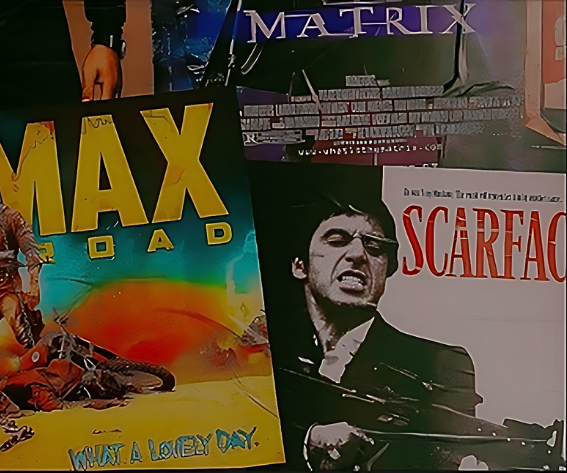On 12 March 1923, American inventor Lee De Forest demonstrated the technology of synchronising sound with film. In the demonstration reel, a man and a woman danced to music performed by a string quartet.
De Forest called his system Phonofilm, which laid the foundation for what we now recognise as the modern soundtrack. His invention, however, did not gain widespread use until 1927, when Fox applied it to its own sound-on-film process known as Movietone.
Cinema and music have been inseparable since the silent era. Soundtracks are essential to storytelling; without them, the impact of events on screen would be entirely different. In selecting just five instrumental scores, we recognise how challenging such a task is — countless soundtracks could be considered. Interestingly, the importance of music is not limited to films. In online casinos, the musical accompaniment of each slot is also crucial, creating atmosphere, excitement, and immersion. If you are interested in exploring the world of online gaming, a Wanted Win no deposit bonus can be a helpful way to start enjoying these experiences with added benefits.
For this list, we focus on orchestral works that not only enhance the films they accompany but also stand on their own as enduring classics.
The Godfather
The Godfather, 1972–1974, composer Nino Rota
It is impossible to overlook the remarkable talent of Nino Rota, whose work includes scores for films by Fellini, Visconti, Zeffirelli, and others. In Hollywood, however, his music for The Godfather stands as one of his most iconic achievements. Rota composed the scores for the first two films in the trilogy, while the third installment was scored by Carmine Coppola, father of Francis Ford Coppola and grandfather of Nicolas Cage.
Drawing on memories from his own childhood, Rota’s virtuoso compositions evoke a deep sense of nostalgia from the very first notes. Paradoxically, it is his music that romanticises this classic gangster saga, adding emotional depth to the story of crime, family, and power.
Blade Runner
Blade Runner, 1982, composer Vangelis
Blade Runner is a cult American science fiction film directed by English filmmaker Ridley Scott, based on Philip K. Dick’s novel Do Androids Dream of Electric Sheep? The movie stars Harrison Ford, Sean Young, Rutger Hauer, Edward James Olmos, Daryl Hannah, Joanna Cassidy, and Michael Emmet Walsh, among others.
In 1982, Scott collaborated with Greek composer Vangelis, known for his work on 1492: Conquest of Paradise, to create a soundtrack that would become legendary. Blade Runner Blues emerged as a standout piece. Though only a small fragment is used in the film, its meditative and anxious tones perfectly capture the futuristic, neon-lit atmosphere of Los Angeles as imagined by Vangelis.
A sequel, Blade Runner 2049, was released in 2017, with music composed by Hans Zimmer in collaboration with Benjamin Wallfisch, bringing a new sonic perspective while paying homage to the original’s iconic sound.
Schindler’s List
Schindler’s List, 1993, composer John Williams
Schindler’s List is a 1993 American historical drama directed by Steven Spielberg, based on the novel of the same name by Thomas Keneally.
Spielberg initially questioned whether he was ready to tackle a story about the Holocaust and even considered passing the project to Polish director Roman Polanski, whose mother had died in Auschwitz. He also approached Sidney Pollack and Martin Scorsese. Ultimately, Spielberg chose to direct the film himself.
Selecting a composer proved challenging. John Williams initially declined, believing the project was beyond the budget. Spielberg’s persistence convinced him to accept, resulting in a haunting and unforgettable score. Williams’ music not only enhanced the film’s emotional depth but also created a soundtrack that stands as one of the most powerful in cinematic history.
Requiem for a Dream
Requiem for a Dream, 2000, composer Clint Mansell
The music for Requiem for a Dream is so iconic that even those unfamiliar with Darren Aronofsky’s film may recognise it. The movie explores various forms of destructive addiction, depicting characters trapped in illusory dream worlds that ultimately collapse under the weight of reality.
Composer Clint Mansell created the score, performed by the Kronos Quartet. The soundtrack is remarkable for its use of string instruments, which typically convey warmth and calm, but here are manipulated to produce sharp, chilling sounds that evoke tension and unease. The film’s leitmotif, Lux Æterna, has become especially famous, frequently used in trailers and even figure skating routines, despite its haunting and somber tone.
Pirates of the Caribbean
Pirates of the Caribbean (5 films), 2003–2017, composers Klaus Badelt and Hans Zimmer
The Pirates of the Caribbean soundtracks capture the thrill of adventure, the intensity of the plot, and the emotions of its characters, creating a sweeping sense of swashbuckling excitement. Klaus Badelt composed the score for the first film, while Hans Zimmer took over for the subsequent entries, infusing the series with his signature dynamic style. Pirates of the Caribbean: Dead Man’s Chest earned a Grammy Award in 2007, highlighting the impact of its music.
Hans Zimmer is one of Hollywood’s most celebrated composers, an Oscar winner whose credits include Sherlock Holmes, Batman Begins, The Dark Knight, Gladiator, and The Da Vinci Code. His work on the Pirates franchise exemplifies how a powerful soundtrack can elevate a film, making the story resonate long after the credits roll.









Leave a reply